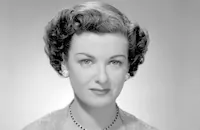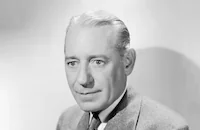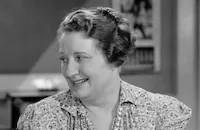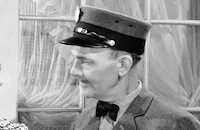The Reckless Moment

Brief Synopsis
Cast & Crew
Max Opuls
James Mason
Joan Bennett
Geraldine Brooks
Henry O'neill
Shepperd Strudwick
Film Details
Technical Specs

Synopsis
Without telling her family, Lucia Harper drives from her seaside home in Balboa to Los Angeles to warn reprobate Ted Darby to stay away from her seventeen-year-old daughter Beatrice. When Darby agrees to leave Bea alone for a price, Lucia refuses to pay him off, convinced that her daughter will have no interest in a man who would accept that kind of money. Back in Balboa, Bea, who has already spoken to Darby on the phone, does not believe her mother's story and refuses to stop seeing him. Lucia, whose husband Tom is out of town, must handle this problem without his help and forbids Bea to return to art school in Los Angeles. That night, Bea sneaks out of the house and meets Darby in the boathouse, but when he admits that he did ask for money, she strikes out at him in anger with her flashlight. Dazed, Darby stumbles outside and is killed when he falls on top of an anchor. Lucia then discovers her distraught daughter and sends her back to bed. Early the next morning, Lucia finds Darby's body and, not wanting her daughter to be involved in a scandal, dumps the body in the bay along with the anchor that killed him. A short time later, Darby's body is found, but as no one in Balboa knows of their acquaintance, neither Lucia nor Bea are suspected. Lucia believes that she has solved their problems until a man named Martin Donnelly comes to the house and offers to sell her love letters that Bea wrote to Darby. A horrified Lucia is willing to pay the money, but cannot get it without driving again to Los Angeles, an act that would make her family suspicious. When she meets Donnelly the following day, she begs for more time. Donnelly, in the meantime, has become enamored of Lucia, and tells her that if she can raise enough to pay his partner Nagle, he will not take his share of the money. Even so, Lucia finds that she cannot borrow such a large sum of money without her husband's signature. She tries to use her jewelry as collateral, but still cannot get a loan without explaining how she will make the payments. She then pawns her jewelry for $800. When Lucia gives Donnelly the money she has been able to raise, he tells her that one of Darby's shady associates has been arrested for Darby's murder. Lucia is upset, knowing the man to be innocent, and tells Donnelly that she killed Darby. Donnelly does not believe her, however, and advises her that even if the arrested man did not commit the murder, he is guilty of many other crimes. Believing herself to be free of the blackmail threat, Lucia is stunned to discover that Nagle has come to her house to demand his payment. Donnelly overhears their argument and fights with Nagle, killing him. Lucia wants to tell the police everything, but Donnelly stops her, explaining that her resemblance to his mother has made him want to behave decently for the first time. After Lucia leaves to fetch bandages for the wounded Donnelly, he runs away with the body. Lucia and her maid, Sybil, follow and see Donnelly crash the car into a post. When Lucia tries to help, Donnelly hands her Bea's letters and tells her the police will think that Nagle was killed in the accident. He sends a brokenhearted Lucia away, and later she learns that before he died, Donnelly confessed to Darby's murder.

Director

Max Opuls
Cast

James Mason

Joan Bennett
Geraldine Brooks

Henry O'neill

Shepperd Strudwick
David Bair

Roy Roberts
Paul E. Burns
Danny Jackson
Claire Carleton
Billy Snyder

Peter Brocco
Karl "killer" Davis
Virginia Hunter
Joseph Palma
Bobby Hyatt
Penny O'connor
Bruce Gilbert Norman
Sharon Monaghan
Charles Marsh
Harry Harvey
Norman Leavitt
Boyd Davis

Ann Shoemaker
Everett Glass
Buddy Gorman
Louis Mason
Pat Barton

John Butler
Kathryn Card
Pat O'malley
Charles Evans
Jessie Arnold
Celeste Savoi
Joe Recht
Mike Mahoney
Glenn Thompson
John Monaghan
Frances Williams
William Schallert
Dorothy Phillips
George Dockstader
Barry Regan
Byron Poindexter
Gail Bonney
Barbara Hatton
John Roy
David Levitt
Sue Moore
Charles Jordan
Kenneth Kendall
Richard Mickelsen
Holger Bendixen
Evelyn Moriarity
Al Bayne
Robert Gordon
Ed Pine
Jack Baker
Cosmo Sardo
Crew
Earl Bellamy
Mel Dinelli
Henry Garson
Burnett Guffey
Gene Havlick
Robert E. Kent
Jean Louis
Russell Malmgren
Cary Odell
Hans Salter
Robert W. Soderberg
Morris Stoloff
Frank [a.] Tuttle
Walter Wanger

Videos
Movie Clip



Film Details
Technical Specs

Articles
The Reckless Moment
Still, just as some critics favor Lang's midcentury American noirs over his famous German silent masterpieces, I prefer Ophuls' moment-in-the-sun Hollywood output, particularly his twin femme-noir home-runs of 1949, Caught and The Reckless Moment. The latter of the two may be, in fact, one of its decade's greatest forgotten movies, a stock melodramatic programmer (adapted from a Ladies Home Journal story, yet) that is reconceived and crafted with such deftness and attention to emotional detail that it shutters scores of contemporaneous noirs and dramas out of the memory. This was not how studio product was mass-manufactured in the immediate postwar years - here we see Ophuls, almost as far from his native element as he could be, find depths in the abyss of the American family virtually no filmmaker had before.
The film's surprising tractor-beam effect emanates from Joan Bennett's SoCal uber-Mom, finicky and harried and gently domineering, and swamped from the very first scene with the unholy pressures of trying to keep her beach-resort-town nuclear family in one piece. Her slut daughter (Geraldine Brooks) has, apparently, been dallying with a middle-aged, quasi-criminal skeeveball boyfriend (a frank and reprehensible Shepperd Strudwick); Ophuls' first scene has Bennett's Mom face off against this guy in a hotel bar with a palpable sourness in her mouth, and the unabridged, untempered honesty of the two characters' self-knowledge and mutual contempt is mesmerizing. Soon, the plot gells: when the slick jerk shows up dead on the family beach, Mom kicks into protective gear and dumps the body, which of course is merely the beginning of her troubles. Constructed with world-class plot glue (and remade as the Tilda Swinton suspenser The Deep End [2001] over 50 years later), the narrative quickly folds in James Mason as a smooth but guilt-ridden blackmailer, and it's up to Bennett's suburban matriarch to keep the balls in the air.
The devil is in the details: Ophulsian compositions tell the story all by themselves, and the master pays close attention to Hitchcockian tension, especially with the breathtakingly physical five-minute-long sequence in which Bennett finds the corpse, drags it down the beach and loads it into the family dinghy, all of it executed without a word spoken and, indeed, in almost complete soundtrack silence. In the scene where Bennett must cross the tracks and go to a shoddy low-rent loan office, her alienated horror is silhouetted, figuratively, against what's glimpsed happening in the next glass cubicle - an entire family crammed into the tiny office, begging for money, at each other's throats. Even the film's locale - Balboa Island, a bridge-accessible hamlet belonging to Newport Beach - is conjured with fabulous specificity, not the noir anonymity we're used to. With Ophuls, there's no ignoring the backgrounds or ancillary action - it all means something, and is all as complex and textured as the foreground drama.
As if the bitter cologne of Lang lingered on Bennett from their '40s fraternization (four films, from 1941's Man Hunt to 1947's Secret Beyond the Door) and rubbed off on Ophuls, the machinery of bad luck and bitter consequences is inexorable, and a good deal of the movie's electricity comes from the fraying tension Bennett must manage in dealing with murder and blackmail while still maintaining a busy household. But Lang was by comparison no master at mature realism, and Ophuls gets even more mileage out of the illicit relationship Mason and Bennett's odds-bodkins pair must maintain in order to find the money to pay off the crime boss pulling the strings; because she's a Mom, she accepts his nefarious presence and quickly starts treating him like an ill-fitting husband (her husband's away on a business trip, inconveniently enough). But he falls for this chain-smoking, indefatigable housewife because she's an indefatigable housewife (she's named Lucia, but he, being Irish, insists on calling her Lucy), albeit one that looks like Joan Bennett, and the tumultuous, messy, spirited house she rules over looks a lot like heaven.
What's even less Langian is the startling and singularly grown-up attention paid to Bennett's character, undoubtedly the best and most rounded she ever had in a career that lasted almost 60 years, a fashionable modern woman forced to engage in cold-blooded crime to save her spoiled children, and keeping her lid on so tight she can nag the kids about manners and wrangle the underworld practically in the same breath. It's difficult to think of a single other film from that era that attends so realistically to a homegrown bourgeois mother - the way she hovers over her shame-sick daughter, or shops in an impatient hurry, or lays out bills on the bed when working out finances, or briskly dishes out familial commands while clearly troubled with darker business. The anxiety and social stress carrying on underneath the surface of The Reckless Moment is hypnotic, and Mason's brooding hood is fascinatingly out of place, but this is Bennett's show, and hers is one of the most nuanced and resonant lead performances of the '40s.
Producer: Walter Wanger
Director: Max Ophuls
Screenplay: Robert W. Soderberg, Henry Garson; Mel Dinelli, Robert E. Kent (adaptation); Elisabeth Sanxay Holding (story "The Blank Wall")
Cinematography: Burnett Guffey
Art Direction: Cary Odell
Music: Hans Salter
Film Editing: Gene Havlick
Cast: James Mason (Martin Donnelly), Joan Bennett (Lucia Harper), Geraldine Brooks (Bea Harper), Henry O'Neill (Tom Harper), Shepperd Strudwick (Ted Darby), David Bair (David Harper), Roy Roberts (Nagel).
BW-95m.
by Michael Atkinson

The Reckless Moment
Quotes
Hell is other people...- Martin
Trivia
Notes
The film's working title was The Blank Wall. It was shot on location in Balboa and Los Angeles, CA, according to the Variety review. This was the last film that noted German director Max Ophüls made in the U.S.














